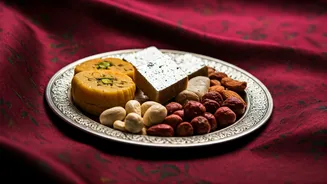Bhai Dooj Overview
Bhai Dooj, also known as Bhau Beej, is a cherished Hindu festival that honors the special connection between brothers and sisters. Celebrated over two
days, Bhai Dooj traditionally falls on the second day after Diwali, symbolizing the final day of the Diwali celebrations. The festival is observed throughout India with great enthusiasm, with families coming together to celebrate and strengthen the bond between siblings. It's a time for siblings to express their love and appreciation for one another, and to participate in rituals that reinforce their relationship. The essence of Bhai Dooj lies in the prayers for long life and well-being, as well as the sharing of gifts and blessings between brothers and sisters. Each year, the festival provides an opportunity to revive familial ties and to celebrate the love and affection that binds siblings together.
Bhai Dooj 2025 Date
Determining the exact date of Bhai Dooj each year depends on the lunar cycle and the Hindu calendar. For 2025, Bhai Dooj will likely be celebrated on a specific date in late October or early November. The precise date will be announced closer to the actual event, based on the lunar calculations that determine the auspicious timings. To be well-prepared for the festivities, it's advisable to check the official Hindu calendar or consult with religious authorities. This will ensure that you are aware of the correct date and time to observe the rituals and celebrate with your loved ones. Planning ahead is key, especially if you intend to travel to be with your siblings or to participate in any special events or family gatherings.
Rituals and Customs
The rituals of Bhai Dooj are deeply rooted in tradition and vary slightly from region to region. Generally, the day begins with sisters applying a tilak (vermilion mark) on their brothers' foreheads, accompanied by prayers for their health and long life. In return, brothers offer gifts and blessings to their sisters, symbolizing their appreciation and care. Another common custom is the offering of sweets and other delicacies, which siblings share with each other. In some areas, sisters also perform the Aarti, a ritual involving a lamp that is waved in front of the brother to ward off evil and to bring him good fortune. Throughout these practices, the core sentiment remains consistent: a celebration of the unique bond between brothers and sisters. These rituals are not just traditions; they are expressions of love, protection, and gratitude that reinforce the strength of familial bonds.
Regional Variations
Bhai Dooj is celebrated across India, with unique customs and traditions emerging in different regions. In some areas, special dishes are prepared and shared, creating a festive atmosphere. For instance, in certain regions, sisters fast until they have performed the rituals, signifying their commitment to their brothers’ well-being. Additionally, some communities have specific songs or chants that are recited during the rituals, adding a melodic layer to the celebrations. These variations enhance the diversity of the festival, reflecting the rich cultural tapestry of India. Whether it is the specific foods, the prayers, or the regional dress, the core message remains the same – the profound love and connection between siblings, celebrated in ways that are uniquely regional and deeply meaningful for the participants.
Significance of the Day
Bhai Dooj has a significant spiritual and social importance, representing the sacred bond of protection and care that siblings share. The festival commemorates Yamaraj, the God of Death, and his sister Yamuna, who, on this day, applied tilak to her brother and prayed for his long life. This act underscores the essence of the festival: a sister's sincere prayers for her brother's health and longevity. It is also an occasion for the renewal of relationships. The practice of exchanging gifts, offering blessings, and sharing meals strengthens the emotional ties between brothers and sisters, reminding them of their shared history and their mutual support. The festival's symbolism transcends mere tradition; it embodies the ideals of love, protection, and the lasting connections that sustain families through the cycles of life.
Preparing for Bhai Dooj
Planning for Bhai Dooj often involves several key preparations to ensure a smooth and memorable celebration. Preparing in advance will help to create a meaningful and joyous experience for all involved. Firstly, sisters often start by preparing a traditional thali (plate) with items such as diya (lamp), sweets, roli (vermilion powder), rice grains, and other symbolic items. Buying gifts for the brother is also an essential part of the preparations, with presents ranging from practical items to thoughtful tokens of affection. Decorating the home, particularly the space where the rituals will be performed, adds to the festive atmosphere. Most importantly, ensuring that siblings are able to come together, even if they live far apart, becomes the primary focus. Coordinating travel plans, sharing schedules, and making arrangements to ensure everyone can participate contributes to creating a cherished and special Bhai Dooj celebration.















